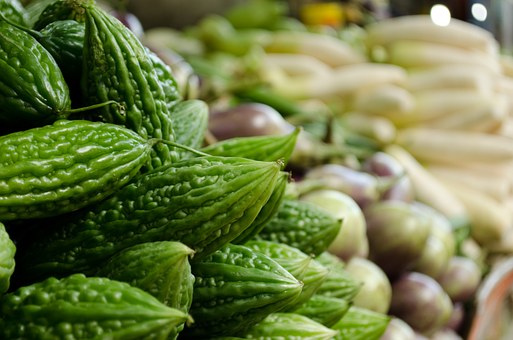Bitter Melon Extract Kills Breast Cancer Cells
© HealthyMuslim. See Terms and Conditions

The study found that bitter melon extract inhibited the growth of breast cancer cells. The researchers decided to study the effect of the extract on breast cancer cells because other researchers had found the preparation lowered blood sugar and cholesterol levels.
The study involved human breast cancer cells exposed to bitter melon extract in the lab.
"To our knowledge, this is the first report describing the effect of bitter melon extract on cancer cells," the author said.
"Our result was encouraging. We have shown that bitter melon extract significantly induced death in breast cancer cells and decreased their growth and spread."
"Cancer prevention by the use of naturally occurring dietary substances is considered a practical approach to reduce the ever-increasing incidence of cancer. Studying a high risk breast cancer population where bitter melon is taken as a dietary product will be an important area of future research," the study author said in a press statement.
The researchers are currently conducting follow-up studies. They are looking at a number of different cancer cell lines in order to investigate how bitter melon halts cancer cell growth. They will also test the vegetable extract in animals, and eventually in human breast cancer patients to see if it will delay or kill breast cancer cells.
Nutrients in Bitter Melon
Bitter melon has the botanical name Momordica charantia, and is also known as bitter gourd, bitter cucumber or karela. It is widely used in Asia and Africa both as a medicine and as a food.
Bitter melon is packed full of vitamins and phytochemicals. It is rich in iron. It also has twice the beta carotene of broccoli, twice the calcium of spinach, twice the potassium of bananas, and contains vitamins A, B, C, phosphorus and good levels of dietary fiber. Some of its active chemicals include lutein, sterols, lycopene, zeaxanthin and GABA.
Extracts found in bitter melon have been reported to have hypoglycemic (blood sugar lowering) properties and in China it has been used successfully as a natural treatment for diabetes. It is also used in traditional medicine as an appetite stimulant, for reducing inflammation, and killing bacteria and viruses. Like most bitter-tasting foods, bitter melon also stimulates digestion.
Tips for Using Bitter Melon
- To reduce the bitterness from the flesh of the fruit when cooking it, it can be salted. Core the melon, sprinkle it generously with salt and let it rest for 10 minutes. Rinse the slices and prepare as you wish.
- Another way to reduce the bitter melon's strong flavor is by blanching it in a pan of lightly salted water before cooking with it.
- Lightly pickling the bitter melon in vinegar and spices also helps to remove its strong flavors.
Link to this article: Show: HTML Link • Full Link • Short Link
Share or Bookmark this page: You will need to have an account with the selected service in order to post links or bookmark this page.





|
Related Articles:
- Olive Oil Is Effective Against A Form of Breast Cancer
- Higher Vitamin D Levels in Blood Associated With Lower Cancer Incidence
- Cancer Said To Be No. 1 Killer by 2010
- Disease-Fighting Properties of Green Tea
- Regular Exercise 'Prevents Breast Cancer'
- Caution on Triclosan - An Anti-Bacterial In Soaps, Toothpastes, Deodorants And Cosmetics
- Green Tea, Blueberry and Raspberry Fruit Extracts Touted as Potential Cancer Fighters
- Artificial Sweetener Aspartame Is Carcinogenic
- Mobile Phone Use 'Raises Children's Risk of Brain Cancer Fivefold'
- Dr Linus Pauling, Vitamin C Infusions and Cancer
You must be registered and logged in to comment.
Most Popular
Latest Articles
Popular Subjects
Health, fitness and longevity
Based upon the principles of health
in the Qur'an and Prophetic Traditions.
HealthyMuslim.Com
There are two bounties in which
most people lose out: good health
and free time. Al-Bukhari.























